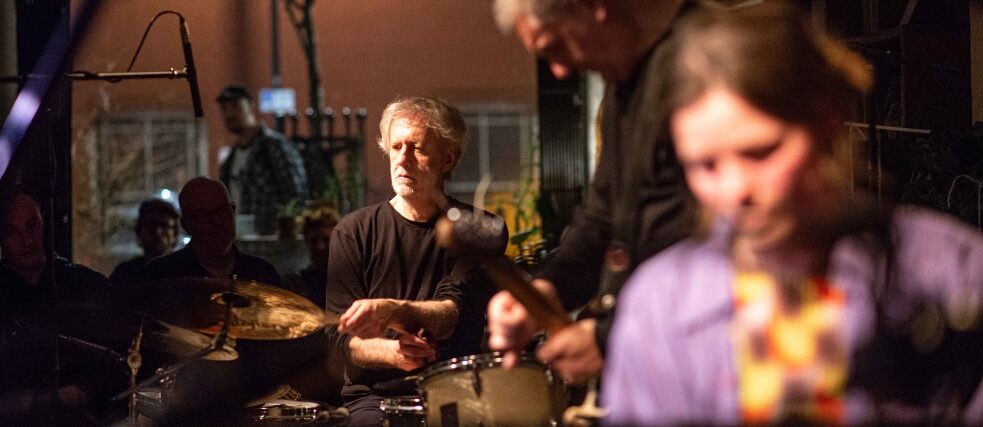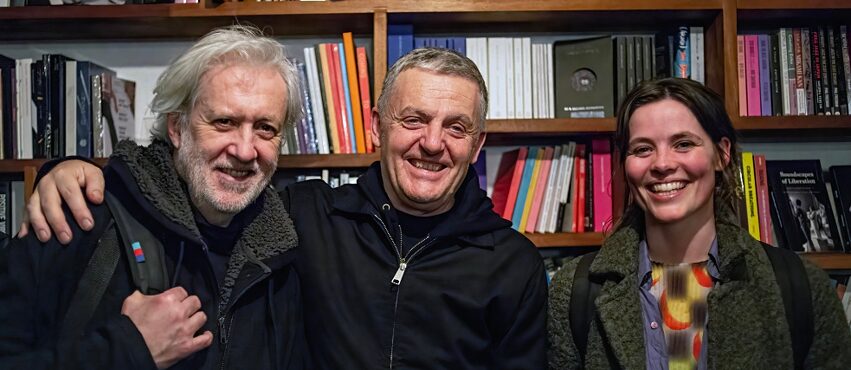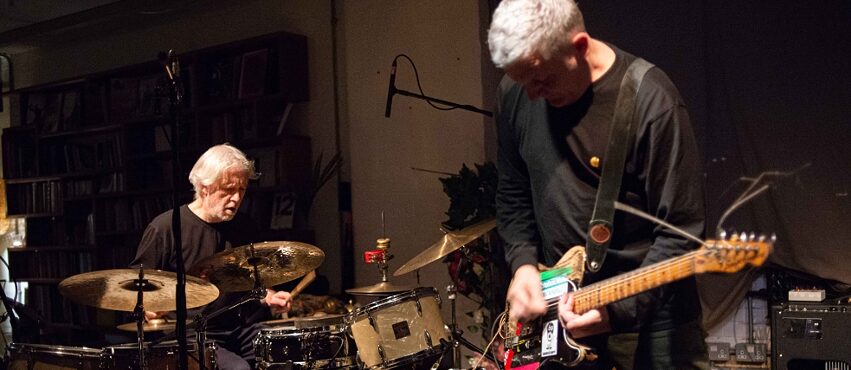Interview
Cafe OTO Residency: Tony Buck at 60

Tony Buck sits on the sofa of his sunlit Berlin apartment, smiling warmly as his black cat invites herself into our interview by winding her way through his legs. "This is Spooky!", he says as she prances up onto the table and nudges at the laptop camera.
Originally from Sydney, Tony's colourful music career has taken him all over the world. He has played drums at some of the world's most notorious festivals and clubs as a solo musician and with his band the Necks. He has played alongside boundary breakers and room shakers from the likes of Branford Marsalis, Clifford Jordan, Paul Lovens, Cecil Taylor, and Evan Parker.
From the 21st until the 23rd of April, we supported Tony in devising his 60th birthday party at the Cafe OTO in Dalston, whereby he invited "dear friends, esteemed colleagues and close collaborators, who make up some the music world's most respected and adventurous improvisers". He said it represented "a chance to recognise and celebrate work - past, present and future, and share some musical obsessions from over the years, as well as new pursuits and inspirations". Those who joined Tony for the residency included Lee Ranaldo, David Watson, Andy Moor, Anja Lauvdal, Bex Burch, Frank Gratkowski, John Butcher and Magda Mayas.
Since the event was such a belting success, we caught up with Tony once he arrived back in Germany to discuss his 40-year-long career, geographical influences and how we can better support the arts scene in times of crisis.
By Lucy Rowan
Where did it all begin for you? Without sounding too corny, can you recall the first time you picked up a pair of drumsticks?
Yes, I was about six, and I was given a toy drum kit by my parents. I think they kind of acquired it because a neighbour had bought it for their son, who was seventeen and when it turned up, it was a toy. So, they kind of sold it to my parents, and it was like, “Wow, this is the thing!” And it was from then on, that was when I knew I had a big affinity for drumming.
How much later on did you start lessons?
Then I went to primary school and when I was about seven or eight, there was a teacher who taught marching drum stuff at the school. So, I did that, and I seemed to have a kind of propensity for that. But that only lasted a year. The teacher was very old, and he just sort of stopped teaching... I guess he died. I don't know. And when I was about thirteen, I thought I better do this seriously - I started having drum lessons with a proper drum kit.
What was the first band you joined?
I guess I started playing with the guitar players in the neighbourhood. I was drawn to that Jazz studies because I really wanted to learn to play the instrument properly - it's kind of the highest level of practice. All the guitar players I was playing with were into Jimi Hendrix, Carlos Santana and John McLaughlin and all that stuff, and you kind of research whom they were inspired by - then you get to Coltrane and Miles Davis and then go back through the history of the music like that.
Before I finished school, I remember I kind of went and auditioned for this jazz course at the university. I got accepted so I kind of didn't bother finishing high school, I just failed the final year. And then you meet people, and you start doing gigs around town and one thing leads to another. By the time I was seventeen/eighteen, I was playing with one of my favourite bands Airs Rock and touring Australia with them. It's quite extraordinary when you're young, how much can happen in two years, now it takes two years to just finish a record.
You can play other instruments but your affinity is with drums. What is it about them that is so appealing?
In a group of musicians, you're playing the deepest sounds in the ensemble but also the highest sounds – drums have such a broad, almost symphonic range. When playing the drums, you can accompany people, set things up or interact in a way that's quite like orchestrating the group. Whether the song has a laid-back or high energy really comes down to the drama played by the drums. A famous musician commented that it's based on drums, and the rest is just decoration – glitter and fairy dust on top.
Well, the short answer was I was living in Amsterdam, and it just got too wet and rainy, and but, um yeah, you know, I sort of left Australia in about 1992 or something. I lived in Tokyo for a couple of years and then moved to Amsterdam, and I was there for four or five years. Berlin just seemed like a good move at the time. The music scene here is fantastic - it was then and continues to be.
What were you doing in Tokyo?
Playing music. I initially went over to do a project with a dancer and sort of stayed there. It was one of those things you could get a kind of two-year work permit thing. And then when that ran out, I kind of made the decision that I didn't want to stay there, but I didn't want to move back to Australia. Since I was touring Europe, Amsterdam was a very convenient and easy place to base myself for a while.
Since you’ve moved around so much, have you noticed your geographic location impacting your improv style?
When I moved to Japan in the early nineties, there was lots of quite extreme noise music happening, and it seemed to be something special to that place. Even though I wasn't necessarily interested in that so much before I arrived there, it just seemed like that's an appropriate way to play and respond to either the time, “the zeitgeist”, if you like. In Japan, it’s a place of two extremes – they either play either very still and quiet or extremely loud, kind of almost violent music!
Moving to Europe, there was and is still a sort of a big tradition of European improvised music that kind of came out of, or at least happened at the same time as the kind of free jazz thing in America. It's a little bit “headier”, and not as physically passionate. And when I moved here, what was interesting was I was really attracted to that music. But in earlier years when I was living in Australia, I wasn’t. But suddenly, when I arrived here it seemed like an appropriate way to play.
So, yeah, it's all a big, long journey of exploration - trying to find different ways of expressing yourself and increasing my vocabulary as an artist in different contexts. So, yeah, there's jazz and there's rock music. I also played a lot of soul music before I left Australia. There’s even this new kind of classical music. I've always been quite inquisitive, looking at how far you can take things with an instrument.
How do local communities shape trends in music and music venues? How does Berlin compare to London?
Berlin is extraordinary, the number of concerts on a day compared to cities like London or New York or Paris, where you might have three to five concerts a week of this sort of music, and then in Berlin, you can have u to ten, twelve in lots of different little venues, where the audiences are sort of small, like twenty, thirty people.
Berlin has this very authentic, relaxed feeling so it's a great place to present works in progress, and people go and just be interested in what you're doing – you don’t feel like you must present a finished product all the time. It’s more like, we’re trying this thing out and the audience is on the same page, and it's very open. Having said that, Cafe OTO is an incredibly significant venue for this style of music I think, from a worldwide perspective.
Well, firstly, it went incredibly well, better than I thought! The audiences were so big, one hundred people or more - the last night with Glacial (Lee Ranaldo, David Watson and Tony Buck) was sold out but that's probably because we had a full, legitimate rock star in! Every set was fantastic. I could’ve just invited friends in like a curator, but the invitation was for me to present my music, so I did, every set was different. I kind of had this fear that I would just sort of be playing the same old Tony through every set, but the contexts were so different, so I got to do so many different sorts of things. Every set stood out so I can't pick a set that stood out! I mean, the last one was fantastic because it was so big, and we don’t get to play together very often. But then some artists have never played together before, like Andy Moor and Anja Lauvdal. They had never met before but got on like a house on fire within two minutes! The music was quite strange, quite unusual. I've never heard music quite like it before. We really gelled, and it was great!
Cafe OTO is an eminent example of where community and music merge and cultivate one another - Why is it important to preserve community-based spaces like these?
Initially, this style of music comes about from a community of people finding a voice together and an audience that's open to the people you put in front of them. It’s about that interaction that happens within the building. People know each other, you can connect with audiences and bring different points of view together, and the contexts are always interesting, so it becomes this sort of community-based music. Playing in and for community-based venues is much more real, you can see it matters to people's lives in a very real way, it's not just about the product. It's kind of an organic thing. The musicians mixing with the audience, everybody having this relationship is important. This music doesn't really translate. I mean, it does translate on record whatever, but there’s a whole other world of depth and meaning when it's played live for people, with people. I think the venue Earth is also like this.
In times of economic crisis like we are currently experiencing, how can we continue to keep our cultural scenes thriving? What could the government and cultural institutions like the Goethe-Institut do better to support artists?
Well, I think within the sense of what the community we're talking about and the music we're talking about, it's essential that there's arts funding and organisations to contribute and help. Yes, it would still happen, but on a smaller scale, people would have to eke out an existence. Even having the Goethe funding for this residency at Cafe OTO made a massive difference – to have the people flown in from Berlin and all of that taken care of just made such a difference!
What's good to keep in mind is a lot of people have a very commercial perspective. They aren't interested unless an event or venue is making money, but it’s not that simple. Culture doesn’t work like this – especially for narrower or even more specialized types. It's important that culture contributes to the quality of life of communities, makes people think, and moves people. When we think back to 1750 in Austria, we don't think about the guy who ran the cotton mill, we think of the key philosophers and musicians who influenced the way we create and think. We should be focusing on the stuff that inspires people to communicate and create. So we need support to facilitate that.
In the UK, the arts and music scenes are often criticized for being classist. To excel creatively, you typically must come from a background that can financially support you whilst you dedicate your time trying to make it as an artist. How can we make music more accessible for everyone?
Well, I think that's true on one level, but I also think it's a bit of a myth. Every aspect of the music industry is inaccessible if you want to think of it like that – instruments can be expensive, and venues have bottom lines and costs to cover so you must reach a certain level before you are invited to them. All those things are true but whatever the limits, people are always going to be creative. Whether it's running your little collectives or doing house concerts, you don’t need to have the best instruments, but incredible music comes out of incredible art.
Motivated people are willing to be creative even with the most imperfect conditions and still achieve and do amazing things. Just look at the history of jazz, for example. The musicians were oppressed and suddenly, instruments were lying around that they could find ways to make music with. Hip hop is another example, started by people, who didn't have access to expensive instruments, but they managed to use turntables - it made them think out of the box and look at what was created, a whole movement and impressive musical talent. The punk rock scene was a reaction to a whole lot of those issues about elitism and classism, and it’s managed to clear out the cobwebs.

